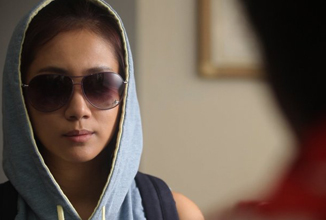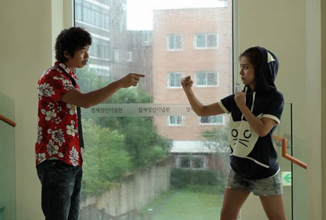"When I reach the time that the future Song-hyun dies, I'll just disappear..."
Synopsis:
Young-gun (Hong Young-geun) starts working at a detective agency specialising in small, inconsequential cases as a means of paying back money he owes to the business' owner (Ha Eun-jung). Having just successfully found an old lady's lost pet stag beetle, Young-Gun is rather taken aback when a beautiful young woman, Song-hyun (Choi Song-hyun), arrives at the agency wanting to engage his services to kill a man, but though he instantly declines her murderous request he is nonetheless intrigued enough by both her desperate plea and her beauty to follow her as she leaves his office.
Just a few moments later, he sees her dragged against her will into a vehicle that subsequently crashes - killing her - and unable to dispel thoughts that sending her away somehow led to her death, Young-gun begins to investigate her bacground.
However, he is soon to discover that Song-hyun's story is far from ordinary; quickly embroiling him in a twisted tale of time travel, sex shops, detachable robotic hands and sword fights...
Review:
Whether in reviews; magazine articles; conference papers or, more accurately, all of the above, I have spoken on a number of occasions about the regular appearance together of love, loss and laughter story elements within individual Korean films, many of which step across genres to almost defy being routinely categorised or pigeonholed. Originally stemming from the attempts of a new breed of directors to revitalise a film industry in which melodrama had taken precedence - since the days of cinematic censorship so constrictive that it became of the few 'safe' (non-political, non-sexual and/or non-controversial) genres considered acceptable by the industry 'powers that be' - this combination of love, loss and laughter within multi-focus narratives has over the years become a citable aspect of Korean Cinema in its own right; perhaps still not as prevalent as melodrama but certainly appearing on almost as regular a basis as any of the individual elements themselves within single genre tales.
In short, had Young Gun in the Time been made when I was writing the aforementioned 'Love, Loss and Laughter' papers and articles it would have fitted into the discussions like a robot hand in a velvet glove, if you will.
Within a film such as this, it is vital in the early stages of proceedings to underline the facts that 'anything goes' in terms of narrative and 'anywhere goes' with respect to genre and themes in order to ensure viewers willingly accept the roller coaster ride to come and director Oh Young-doo deftly achieves this with the use of a few fairly simple scenes:
As we join Young Gun in the Time, we see a man being stalked, then murdered, by an assailant who can apparently vanish and reappear at will - setting up both the sci-fi and mystery thriller genre ideas; the subsequent first interactions between mild-mannered male Young-gun and his forceful, loud and pushy female boss positively scream of classic New Korean Cinema wave films (from the late 90s onwards) detailing a comedic reversal of long-depicted patriarchal male/female roles, the humour present extending further with the appearance of the pale, hunched-over old woman distraught at the loss of her pet stag beetle; and the arrival of Song-hyun at the detective agency combined with her subsequent death give the first inklings of what will become the love and loss elements of the narrative.
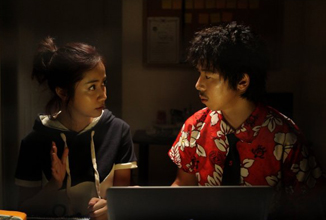 |
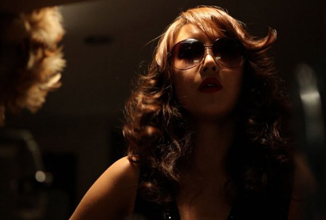 |
Within these, though the relationship between Young-gun and his boss initially appears to be the main focus of the male/female role characterisations detailed above, there is a similar but much more important aspect present between the characters of Young-gun and Song-hyun and, in fact, Song-hyun is far closer to classic Korean Cinema depictions of outwardly feisty, strong-willed ladies hiding a gentle heart beneath the veil of personality. Ultimately, it is from her - directly and indirectly - that the majority of the later love, loss and laughter elements stem. Though the relationship between Song-hyun and Young-gun is not a romance as such, platonic love and caring is still love at the end of the day and with a great many classic Korean Cinema love, loss and laughter combinations featuring off-kilter or unconventional relationships at their core, Young Gun in the Time not only remains as a prime example but perhaps becomes an even stronger one because of that fact.
I've mentioned the New Korean Cinema wave once already in this review but I'm going to reference it again, right here, right now, for Young Gun in the Time sits so well within numerous films from that period that it feels like one of their contemporaries rather than a thematic step back in time - and that's a complement, by the way.
Side note: I am, as I'm sure you are, finding it rather hard to rationalise the fact that I had the sheer nerve to use the phrase "thematic step back in time" in the midst of discussing a film featuring time travel but it does serves its purpose at the end of the day, so there you go and there it stays. But I digress, so back to the subject at hand...
Oh Young-doo clearly revels in creating multi-faceted work but while it could be said that is simply a part of his directorial style, I, for one, cannot escape the feeling that he is in some shape or form deliberately attempting to step away from the increasing trend - especially in terms of blockbusters - of Korean films being made to be more akin to Hollywood and if that is indeed the case his independence certainty gives him far greater freedom to do so. Of course, that same independence places Oh Young-doo's films under severe financial constraints and though winning the Grand Prix award at the 2011 Yubari International Film Festival has since allowed him access to bigger budgets, for Young Gun in the Time low budget really is still the order of the day. Nonetheless, that in itself is part of the film's charm and in no way detracts from what is ultimately a warm; engagingly wacky; and genuinely gently funny tale. In fact, I'd almost go as far to say that Young Gun in the Time is made all the stronger by its financially modest production; both in terms of its narrative warmth and comedic elements.
And speaking of Hollywood, (to my mind, anyway) US cinema’s seemingly endless need for extraneous exposition is one of its biggest failings, and it almost goes without saying that any film detailing the intricacies of time travel will have to contain a certain amount of (supposedly scientific) explanation. However, in the case of Young Gun in the Time director Oh Young-doo separates himself from this Hollywood trend by actually pushing the concept further and providing deliberately over-complex exposition in a conversation between Song-hyun and Young-gun to ‘explain’ - or more accurately talk in circles about - time travel concepts; thereby bringing yet more gentle humour to play and almost using exposition to parody exposition, in the process.
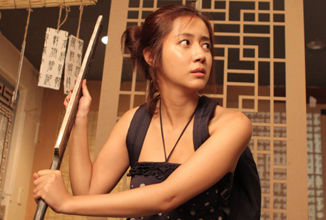 |
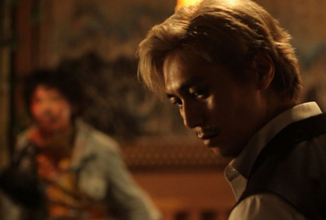 |
Cinematically, anyone familiar with Oh Young-doo’s previous films will pretty much know what to expect from Young Gun in the Time in relation to visual narrative realisation, action and production overall. From highly choreographed fight scenes, to characters regularly filmed against back-projected scenes, to fairly rudimentary special effects, all work well throughout and regardless of the extent to which finances shaped their appearance they all combine nonetheless in a coherent style.
Assuming that Oh Young-doo at some point gets the opportunity to produce a film with a far larger budget it will be interesting to see if certain lo-fi elements still appear. I somehow feel that, to an extent at least, they will remain a part of whatever production at which he sits at the helm.
Cast:
The entire cast of Young Gun in the Time give performances that serve this wacky narrative to a tee, with Hong Young-geun and Ha Eun-jung (who both also appeared in Oh Young-doo’s ‘Invasion of Alien Bikini’) providing portrayals that sit nicely just between tongue-in-cheek and deliberately overplayed.
However, it is Choi Song-hyun whose nuanced performance stands head and shoulders above the rest; her experience standing out and adding greatly to the film as a whole. Any Korean film featuring a combination of love, loss and laughter needs viewer empathy to be created, and kept, for its characters throughout and Choi Song-hyun successfully achieves exactly that in almost every scene she appears.
Cast: Hong Young-geun, Choi Song-hyun, Ha Eun-jung
Director:
Oh Young-doo
Summary:
‘Young Gun in the Time’ uses classic Korean cinema genre merging to be at once science fiction, mystery thriller, action, romance and comedy. Though it is low budget through-and-through, that is in fact one of the many charms of this warm, engaging and gently funny film.
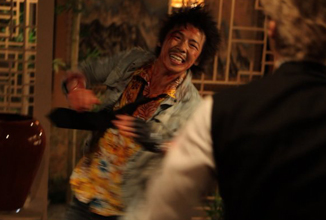 |
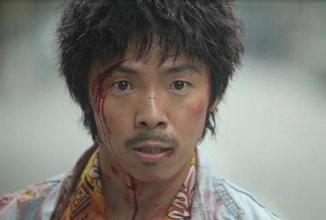 |
'Young Gun in the Time' is not yet available on DVD or Blu-ray but it will be screened as part of the Terrcotta Far East Film Festival taking place in London, UK, from June 6th-15th 2013. Full details can be found, and tickets booked, at:
http://terracottafestival.com/
I would sincerely like to thank Terracotta Distribution for providing me with a screener of 'Young Gun in the Time' for the purposes of this review..
|


